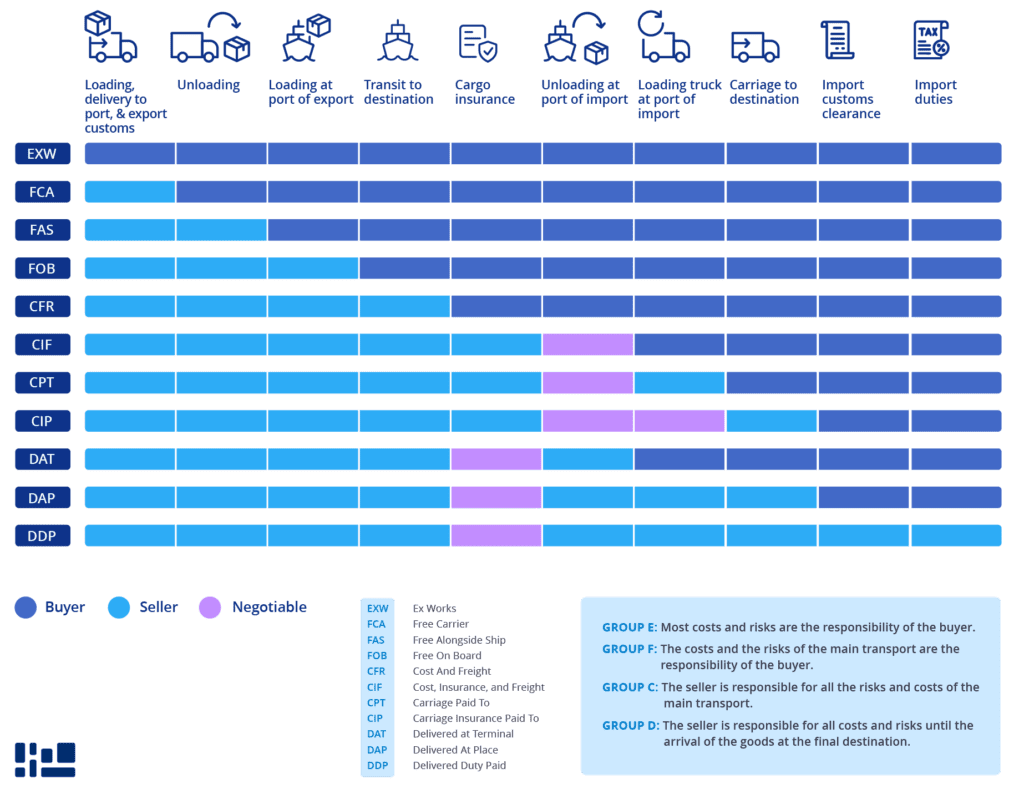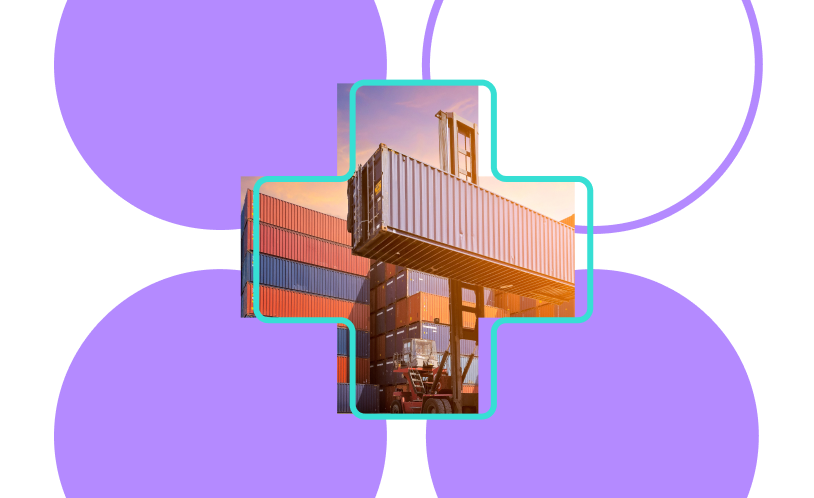Part of the Comprehensive Incoterms Guide
Incoterms define the responsibilities of buyer and supplier in shipping. Ex Works (EXW) is one such term.
Let’s explore what ExWorks incoterm is and what it means for shippers.
What is Ex Works & what does it mean in shipping terms?
EXW (EX Works) shipping represents an arrangement in which the buyer takes on the responsibility for the entire logistics process, starting from the supplier’s warehouse and concluding at the cargo’s ultimate destination. In this scenario, the seller’s obligations are minimal, limited to making the goods available at their premises or another named place mutually agreed upon in the contract. The buyer organizes transportation and covers all associated costs, risks, and complexities involved in moving the goods, including export customs clearance and import duties.
If you’re importing or exporting freight, choosing Ex Works means you are responsible for moving your goods from start to finish – which means you’ll work with a forwarder who will handle moving your goods from start to finish. Your supplier won’t take part in moving your goods at all.

EXW Price: How to calculate Ex Works cost
If you choose Ex Works to ship your goods, you’ll be responsible for the full range of freight costs, including:
- transport from supplier warehouse to port of origin
- loading and unloading
- moving your goods on your selected mode
- customs export and import fees
- terminal charges
- transport from the destination port to your warehouse
You can use our freight rate calculator to help you estimate your freight cost when shipping under the EXW incoterm. Simply choose container, box, or pallet shipping, enter your dimensions and weight, and you’ll get an instant estimate of freight shipping costs.
Ex Works advantages & disadvantages
✅ Pros of EXW shipping incoterm
- Provides more visibility and control to the buyer over the shipping process
- Allows for transparent pricing
- Makes it possible for buyers to consolidate multiple shipments from the same destination
- Makes manufacturing-focused markets, such as China, more accessible (that’s because many local sellers in China don’t have export licenses)
- Good option when the buyer wants to hide the identity of the supplier (for competitive advantage)
❌ Cons of EXW shipping incoterm
- The buyer assumes all the risks and costs associated with transporting the goods from the seller’s premises – which means that if anything goes wrong during transport, the buyer bears the risk of loss or damage. Arranging for freight insurance can mitigate these risks.
- The buyer is responsible for all the costs associated with the transportation of the goods, including insurance, freight, and customs clearance.
When is an Ex Works agreement used?
There are several situations where an EXW works well for both parties. Here are a few:
- When the buyer and seller are located in the same country, it’s often the case that the buyer can easily arrange for transport
- When the buyer has established relationships with freight forwarders or carriers and prefers to handle the logistics themselves
- When the buyer wants to combine multiple shipments from the same destination
- When the buyer is purchasing goods from a supplier who does not have the resources or expertise to handle shipping
- When the buyer is purchasing goods that require specialized handling or transport, and they have experience handling the logistics of such goods
EX Works Responsibilities Summary Table
| Buyers Responsibility | Sellers Responsibility | |
| Loading, delivery to port, & export customs | Yes | x |
| Unloading | Yes | x |
| Loading at port of export | Yes | x |
| Transit to destination | Yes | x |
| Cargo insurance | Yes | x |
| Unloading at port of import | Yes | x |
| Loading truck at port of import | Yes | x |
| Carriage to destination | Yes | x |
| Import customs clearance | Yes | x |
| TAX Import duties | Yes | x |
What are the EXW responsibilities for a buyer?
If you are a buyer in an ExWorks arrangement, you’ll be responsible for:
- Pickup of cargo from the agreed location, including loading charges
- Arranging transportation to the port of origin
- All export documentation and customs duties or surcharges for detention/examination
- All terminal charges at the origin and destination port
- Arranging for a carrier, including loading, unloading, and transport costs
- Insurance and bonds
- Import documentation and customs charges
- Arranging last-mile delivery
Note: In EXW, the buyer also assumes all risks in case of damage/loss of goods in transit.
What are the EXW responsibilities for a seller?
In an ExWorks arrangement, the seller is responsible for:
- Providing the goods or freight
- Helping with key documents like commercial invoice, bill of lading or air waybill, export license, and certificate of origin.
- Communicating the status and location of goods pre-pickup
- Making the goods available for pickup at the named place
- Packaging and labeling as needed
Where Is the ‘Named Place’ For Handing Over Responsibility From The Seller To The Buyer?
The named place is an agreed-upon location in the contract where the goods are exchanged. This is where the seller’s responsibility ends, and the buyer is supposed to pick up the goods. It’s generally the seller’s factory, mill, plant, or warehouse.
What Does The ICC Say About EXW?
The International Chamber of Commerce (ICC) has some general recommendations when using EXW incoterms in contracts. It advises:
- Both parties should agree on the place of delivery, time of delivery, and other relevant details before the shipment.
- The parties should have a written agreement, such as a sales contract or purchase order, that outlines the terms of the EXW agreement.
Is Ex Works A Good Choice?
Most Freightos.com importers and exporters choose Ex Works, and what it practically means is that your forwarder handles every step of shipping your goods, from pickup at the supplier’s warehouse all the way to the destination. If you were to choose FOB (another popular choice), the difference is that your supplier handles transport to the origin port, and any associated charges.
EXW gives the buyer – and by extension the forwarder you choose – complete control of the shipping process.
EXW Shipping Tips And Tricks
- If the seller is going to help load, make sure to include this elsewhere in the sales contract
- When selecting a forwarder, check that they are able to arrange export customs clearance
- If your supplier is handling packaging and labeling, make sure they understand the requirements. This is especially crucial if you’re shipping Amazon FBA
EXW vs FCA
| EXW (Ex Works) | FCA (Free Carrier) | |
| Meaning | The seller makes the goods available at their premises, and the buyer is responsible for all transportation and loading costs. | The seller is responsible for delivering the goods to a carrier specified by the buyer. The buyer is responsible for all transportation costs beyond that point. |
| Delivery | Buyer’s premises | Warehouse/terminal to the carrier specified by the buyer |
| Loading | Buyer’s responsibility | Seller’s responsibility |
| Transportation | Buyer’s responsibility | Seller’s responsibility till the goods reach the carrier. Buyer’s responsibility beyond that point |
| Insurance | Buyer’s responsibility | Buyer’s responsibility |
| Risk | Buyer bears it from the point of loading | Buyer takes from the point of delivery to the carrier |
| Customs Documentation | Buyer’s responsibility | Seller takes charge of export customs while the buyer handles import customs |
READ MORE: Free Carrier Shipping (FCA)
EXW vs FOB
| EXW (Ex Works) | FOB (Free on Board) | |
| Meaning | The seller fulfills their obligation by making the goods available at their premises. The buyer is responsible for all costs and risks of loading, transportation, and customs clearance. | The seller fulfills their obligation by delivering the goods on board the ship at the port of shipment. Buyer is responsible for all costs and risks of transportation and customs clearance. |
| Delivery obligation | Seller is only responsible for making goods available at their premises | Seller is responsible for loading goods onto the ship |
| Transportation | Buyer is responsible for end-to-end transportation and customs clearance | Buyer is responsible for carrier transportation and customs clearance, but the seller is responsible for loading goods onto the ship and transporting them till that point |
| Transfer of risk | Risk of loss or damage to the goods transfers from seller to buyer when the goods are made available at the seller’s premises | Risk of loss or damage to the goods transfers from seller to buyer when the goods are loaded onto the ship |
| Insurance | Buyer’s responsibility | Buyer’s responsibility |
| Applicable modes of transportation | Any | Ocean or inland waterway only |
EXW FAQs
Q) Who is responsible for arranging and paying for transportation under Ex Works (EXW) terms?
In Ex Works (EXW) terms, the buyer is responsible for arranging and paying for transportation from the seller’s premises to the desired destination. The seller’s responsibility ends once the goods are made available at their premises.
Q) Does the seller assist with export licenses and paperwork in Ex Works (EXW) transactions?
Yes, the seller is obligated to assist the buyer in obtaining any necessary export licenses or required paperwork. However, it is the buyer’s responsibility to cover the actual fees associated with obtaining these documents.
Q) Can the seller load the goods onto a carrier for the buyer in Ex Works (EXW) terms?
While the seller is not obligated to load the goods onto a carrier, it is not uncommon for sellers to provide assistance in this regard. However, any risks or issues that may arise during the loading process are the buyer’s responsibility, including any associated costs if something goes wrong.
Freightos.com helps you get a fair estimate of freight costs end-to-end. Compare your cost liability under different incoterms with our integrated logistics management platform. Start shipping now!



